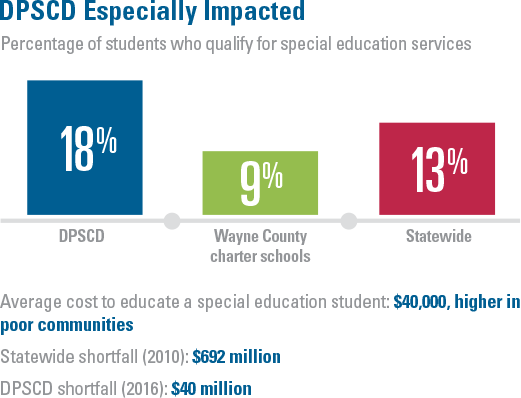Fully Fund Special Education
State and Federal Action Required
What We Know
Children with special needs deserve to have those needs met. Unfortunately, Michigan’s system for funding special education services is so inadequate that most districts must take revenues from their general education budget to provide special education services. Diverting funds in this way decreases funding for all other school programs. Plus, services for children with disabilities may not always meet best-practice standards given financial constraints.
This has created a major problem in DPSCD, which is diverting over $40 million annually from its general fund to special education services. Statewide, school districts and charter schools are diverting $692 million a year. Urban schools are especially hurt because of their low local tax bases.

Michigan leaders must band together to advocate for state and federal policy change to fully fund mandated special education costs. This is needed to address the current condition where school programs must be reduced to all students because the funding provided for required special education programs does not cover the cost to provide these programs.
 TACTICS:
TACTICS:
- Build an advocacy coalition that includes: Lt. Governor’s Special Education Funding Subcommittee; the Metropolitan Affairs Corporation / Southeast Michigan Council of Governments (MAC/SEMCOG); the statewide School Finance Research Collaborative; and any other group that has studied special education funding to advocate for a better funding structure. We offer the following ideas to this coalition:
- Establish a “weighted student funding formula,” which recognizes the reality that students with special needs require additional resources, based on similar models from other states.
- The federal government should cover 40 percent of special education costs as originally promised when the federal mandate for requiring special education services became law (it now covers less than 10 percent).
- Medicaid reimbursements should be increased to allow for all school-related costs, including
training (secretarial, CPI, EPI, parents), along with administrative costs and planning for 504 and IEP plans. - Pool efforts with other states as feasible.
- DPSCD serves a disproportionately larger share of special education students in Detroit. All schools (DPSCD and charters) should conduct an external audit around their special education practices to ensure program quality and efficiency.
- Review current Medicaid billing practices to increase funding, including helping schools take advantage of current allowable Medicaid reimbursements.
